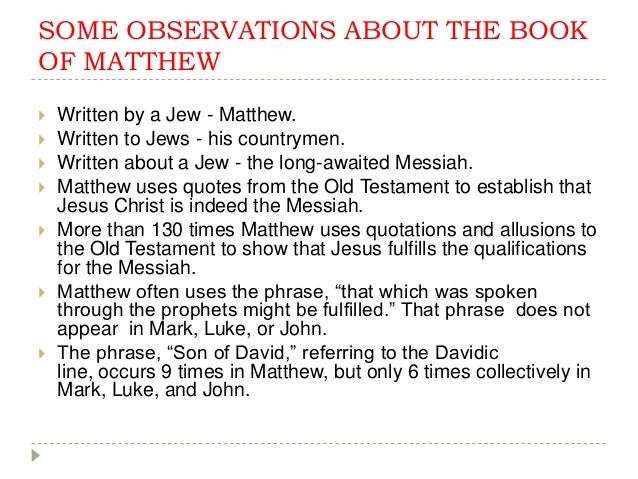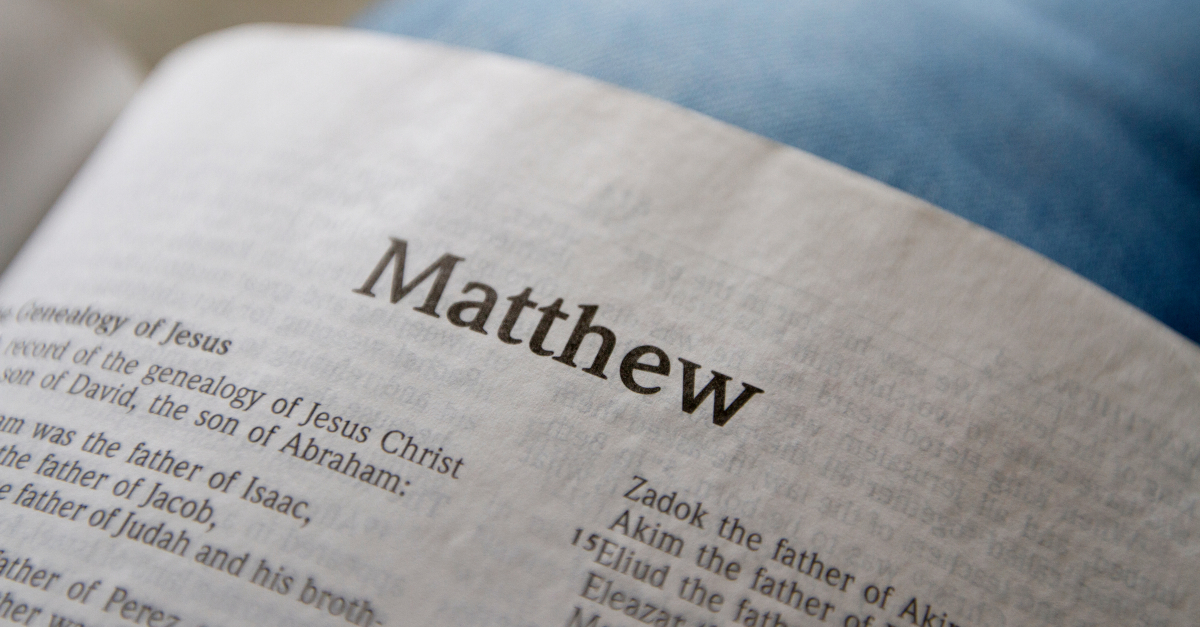Have you ever wondered about the people who wrote the books of the Bible? For many, the name Matthew brings to mind one of the four Gospels, a foundational part of the New Testament. But a question often comes up: Did Matthew write his own book? It's a really interesting question, and it matters to a lot of people who want to truly get a feel for how these ancient writings came to be. So, let's just talk about what we know, and what we might not know, about this important figure and the writings attributed to him.
This inquiry isn't just about some old historical detail; it actually touches on how we see the Gospel itself. Knowing a bit about its origins, who might have penned it, and when, helps us appreciate its message in a deeper way. It's about getting closer to the source, you know, and understanding the context that shaped these incredibly influential stories. We're going to explore what tradition says and what modern scholarship suggests, giving you a pretty good picture of the situation.
Many people, perhaps like you, have heard the name Matthew linked to one of the Gospels. You might even picture him as one of Jesus's original followers, sitting down to write. But the story behind the Gospel of Matthew is a bit more involved than just one person jotting things down. It involves early church beliefs, careful study of the text, and even some detective work into how the Gospels relate to each other. We'll look at all of that, so you can make your own sense of it all.
Table of Contents
- Who Was Matthew? A Glimpse at the Man
- The Big Question: Did Matthew Write His Own Book?
- What Does This Mean for the Gospel?
- People Often Ask About Matthew's Gospel
- Exploring Further
Who Was Matthew? A Glimpse at the Man
Matthew's Life and Calling
The Matthew we're talking about, you know, is traditionally identified as one of Jesus's twelve close followers. Before he joined Jesus's group, he had a very different kind of job. He was a tax collector, also known as Levi, which was, in some respects, a rather unpopular profession back then. People generally didn't care for tax collectors much because they worked for the Roman authorities, and sometimes they even charged more than they should have.
His calling by Jesus is a pretty striking story, actually. Jesus simply sees him sitting at his tax booth and says, "Follow me." And just like that, Matthew gets up, leaves his old life behind, and becomes a disciple. This moment shows Jesus's willingness to include everyone, even those considered outsiders. It's a powerful picture of transformation, you know, and it's quite a change for Matthew.
After joining Jesus, Matthew would have spent a lot of time with him, hearing his teachings and seeing his actions firsthand. This experience, arguably, would have given him a unique perspective on Jesus's life and message. He was there for many of the key events, so, he would have had direct memories to draw upon, or so it would seem.
Personal Details & Bio Data
| Name | Matthew (also known as Levi) |
| Profession (Pre-Disciple) | Tax Collector |
| Role | One of the Twelve Apostles of Jesus |
| Associated Gospel | The Gospel of Matthew |
| Key Characteristics | Jewish background, emphasis on Jesus as the Messiah fulfilling prophecy, detailed teachings. |
| Traditional Authorship | Attributed as the author of the Gospel of Matthew. |
The Big Question: Did Matthew Write His Own Book?
Early Church Traditions
For a very long time, pretty much everyone accepted that Matthew, the apostle, wrote the Gospel of Matthew. Early Christian writers, people like Papias of Hierapolis, who lived around 60-130 AD, said things about Matthew collecting the sayings of Jesus. Papias, for example, is quoted by Eusebius as saying, "Matthew compiled the sayings in the Aramaic language, and everyone translated them as well as he could." This tradition, you know, gave a lot of weight to Matthew's direct involvement.
Other early church figures, such as Irenaeus and Origen, also spoke of Matthew as the Gospel's author. They saw it as pretty clear-cut, honestly. This consistent belief across different early Christian communities really helped solidify the idea that the apostle Matthew was the one who put pen to paper. It's a strong historical thread, in a way, connecting the Gospel to him.
These early traditions suggest Matthew might have initially written down Jesus's teachings, perhaps in Aramaic, which was a common language in that region. Later, someone might have translated or expanded upon this original material into the Greek version we have today. So, in some respects, the idea is that he started it, or at least provided the core content.
Scholarly Perspectives and Challenges
Now, when we get to more recent times, especially in the last couple of centuries, scholars started looking at the Gospels with a very critical eye. They began noticing things that made the traditional authorship a little less straightforward. For example, the Gospel of Matthew we have is written in Greek, and it seems to use the Gospel of Mark as a source. This is a bit of a puzzle, because Mark is traditionally seen as being written later than Matthew's supposed Aramaic collection, and Mark was not an apostle himself. So, it raises questions, you know.
If Matthew, an eyewitness apostle, wrote his Gospel, why would he rely so heavily on Mark, who was not an eyewitness? It seems a little odd, perhaps, that he wouldn't just use his own memories. This is one of the main reasons why many scholars today think the Gospel of Matthew, as we know it, was probably put together by someone else, perhaps a Jewish Christian, who used Matthew's teachings, Mark's Gospel, and other sources. It's a complex picture, really.
The language itself also presents a point of discussion. The Greek of Matthew is pretty good, you know, suggesting a skilled writer, not just a simple translation of Aramaic notes. This doesn't completely rule out Matthew's influence, but it does suggest that the final form of the Gospel might have come from a different hand, or at least a different stage of writing. It's a subtle but important distinction, in a way.
The Synoptic Problem and Q Source
To really get a feel for why scholars question Matthew's direct authorship, we need to talk about something called the "Synoptic Problem." This is the puzzle of why Matthew, Mark, and Luke are so similar to each other, yet also have their own unique parts. They can be "seen together," which is what "synoptic" means. It's almost like they shared notes, or, you know, copied from each other.
The most common idea to explain this is the "Two-Source Hypothesis." This theory suggests that Mark's Gospel was written first, and then both Matthew and Luke used Mark as a main source. They also, apparently, used another shared source, which scholars call "Q" (from the German word "Quelle," meaning "source"). This "Q" source is thought to be a collection of Jesus's sayings, which Matthew and Luke both drew from, but which isn't found in Mark. So, it's like a missing piece of the puzzle, so to speak.
If Matthew used Mark and Q, it makes it less likely that the Gospel of Matthew was written entirely by the apostle Matthew himself, as an original eyewitness account. It suggests a later author, someone who gathered existing materials to create their Gospel. This doesn't mean Matthew had no part; his teachings or notes might have been part of the "Q" source, or used in other ways. But it does mean the final book was a bit more of a collaborative or compiled effort, in some respects, than a single author's direct writing.
What Does This Mean for the Gospel?
The Gospel's Unique Voice
Even if the apostle Matthew wasn't the sole writer of the Gospel that bears his name, the book still has a very distinct personality. It's pretty clear that the author, whoever they were, had a deep understanding of Jewish traditions and the Old Testament. The Gospel of Matthew constantly shows how Jesus fulfills prophecies from the Hebrew Scriptures. This focus makes it very appealing to a Jewish audience, you know, showing Jesus as the long-awaited Messiah.
The Gospel also includes many of Jesus's long teachings, like the Sermon on the Mount, which is, in a way, a central part of Christian ethics. The author clearly wanted to organize Jesus's words and actions into distinct sections, making them easier to learn and remember. This organized approach gives the Gospel a really systematic feel, which is quite helpful for teaching. It's a very structured book, so, that.
So, regardless of who exactly held the pen, the Gospel of Matthew speaks with a powerful and coherent voice. It presents Jesus as a great teacher and the true King of Israel, bringing a new covenant. Its unique emphasis on Jesus's teachings and his role in Jewish history makes it a very important text, and it's been influencing people for nearly two thousand years. It's truly a significant piece of writing, you know, even today.
Why Authorship Matters (and Doesn't)
For some people, knowing the exact author of a biblical book is extremely important. They feel it affects the book's authority and truthfulness. If Matthew didn't write it, does that make it less reliable? This is a fair question to ask, and it's a concern for many who value the Bible as God's word. The idea of direct apostolic authorship can give a text a certain kind of weight, so, that.
However, for many scholars and believers, the identity of the final writer is less important than the content and message of the Gospel itself. The early church accepted the Gospel of Matthew because of its powerful message about Jesus, its connection to apostolic teaching, and its consistent use in Christian communities. They believed it accurately conveyed the truth about Jesus, regardless of the precise hand that wrote it down. It was seen as truly inspired, you know.
What truly matters, in a way, is that the Gospel of Matthew provides a faithful account of Jesus's life, teachings, death, and resurrection. It has shaped Christian belief and practice for centuries, and its message continues to resonate with people across the globe. Whether Matthew himself wrote every word or inspired others to compile it, its enduring impact is what really counts. It's a book that has changed countless lives, so, that's pretty amazing.
People Often Ask About Matthew's Gospel
Here are some questions people often have about the Gospel of Matthew and its origins:
Was Matthew an eyewitness to Jesus?
Yes, according to tradition, Matthew was indeed one of Jesus's twelve apostles. This means he would have been present for many of Jesus's teachings and miracles. So, he would have seen a lot of it firsthand, you know, which is pretty significant.
What evidence supports Matthew's authorship?
The main evidence comes from early Christian writers and church traditions, like Papias, who said Matthew collected Jesus's sayings. This consistent testimony from the early centuries is what largely supported the traditional view. It's a historical chain of belief, in a way.
Who was Matthew the Apostle?
Matthew the Apostle was a tax collector called Levi before Jesus chose him to be one of his twelve closest followers. He left his previous life behind to follow Jesus and became a key figure in the early Christian movement. He's a pretty interesting person, really, given his background.
Exploring Further
The question of Did Matthew write his own book? is a really engaging one, and it shows us that the history of the Bible is quite rich and layered. It’s not always as simple as we might first imagine, and that’s perfectly fine. Learning about these historical discussions can actually deepen our appreciation for these ancient texts. It helps us see them as living documents that were shaped by real people, in real times, trying to preserve and share important truths. You can learn more about the Gospels on our site, too.
If you're interested in digging a bit deeper into the early Christian writings and how they came to be, there are many excellent resources out there. You might want to look into books on New Testament introduction or biblical scholarship. These kinds of studies often go into much more detail about the Synoptic Problem and the various theories about Gospel origins. It’s a fascinating field, honestly, and there’s always more to learn about the people and ideas that shaped these foundational texts. For a good starting point on biblical authorship, you could check out this resource on Bible Odyssey, which discusses the Gospel of Matthew's background.
Understanding the different views on Matthew's authorship doesn't lessen the Gospel's importance. Instead, it invites us to consider the rich history of how these sacred stories were passed down and put into writing. It shows us the careful work that went into preserving Jesus's message for future generations. It’s a testament to the enduring power of these stories, you know, that they continue to be studied and cherished even today. So, keep asking those good questions!
Related Resources:



Detail Author:
- Name : Clemmie Lebsack
- Username : dare.electa
- Email : vvonrueden@nitzsche.com
- Birthdate : 1983-08-15
- Address : 837 Marisa Mountains Apt. 497 New Pearl, ID 54112
- Phone : 1-315-901-1485
- Company : Ryan PLC
- Job : Lodging Manager
- Bio : Deleniti sit rem modi. Reprehenderit molestias vero perferendis quasi incidunt occaecati itaque. Dolorem eos et quam voluptatum modi. Est eveniet ut veritatis occaecati blanditiis.
Socials
instagram:
- url : https://instagram.com/elizabeth_wisozk
- username : elizabeth_wisozk
- bio : Amet ab est explicabo. Hic et harum ut dolorem. Cupiditate dicta id nostrum.
- followers : 1521
- following : 904
twitter:
- url : https://twitter.com/elizabethwisozk
- username : elizabethwisozk
- bio : Voluptas inventore eos quis ipsam iure rem facere ut. Et ullam aliquam quisquam eveniet non nobis quo at. Voluptates est ad fuga ut. Et sit aperiam et sed.
- followers : 342
- following : 705
facebook:
- url : https://facebook.com/elizabeth8893
- username : elizabeth8893
- bio : Ex et inventore quam quia vitae qui ea qui.
- followers : 1298
- following : 556
linkedin:
- url : https://linkedin.com/in/wisozk1996
- username : wisozk1996
- bio : Fugit natus fugiat fugiat.
- followers : 2512
- following : 1401